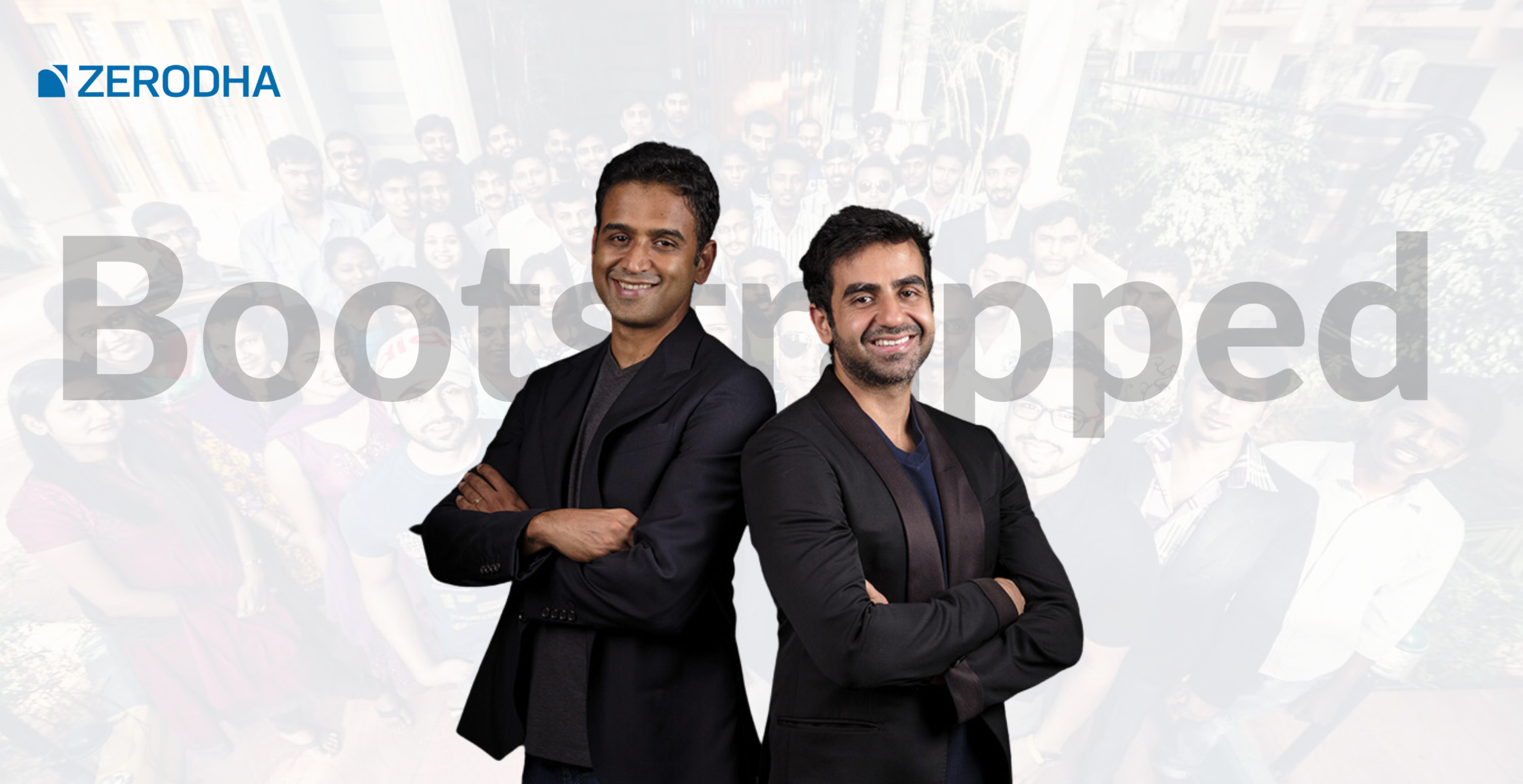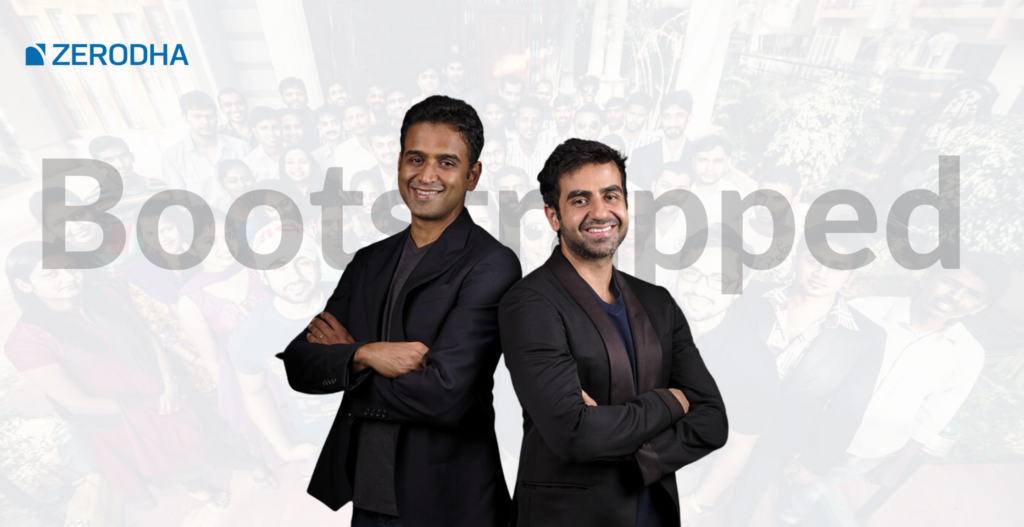
Zerodha: Disrupting the Brokerage Industry

Introduction Zerodha, founded by Nithin Kamath and Nikhil Kamath in 2010, has revolutionized the brokerage industry in India with its discount brokerage model and innovative trading platform.
Growth and Success Zerodha’s focus on low-cost trading and advanced technology has attracted millions of traders and investors. The company achieved unicorn status in 2020, cementing its position as a leader in the financial services sector.
Future Prospects Zerodha aims to continue innovating and expanding its services, making trading and investing more accessible to everyone.
How and When did Zerodha start?
In 2005, a foreign HNI was impressed with Nithin’s trading portfolio. So, he gave Nithin a ₹25 lakh cheque to manage his Demat account. Later, he left his call center job as he started handling more accounts. But, there was a problem.There was no single platform where Nithin could switch between different accounts seamlessly.To tackle this situation, in 2006 he joined Reliance Money as a sub-broker. This allowed him to buy and sell stocks from a single platform.But in all this, he realised one thing. There was a huge gap between the commissions charged by the brokers and the actual amount clients got after the transaction.
He also figured out why many young people are not interested in stock trading. The reason was simple – high brokerage charges and a complex trading process.As Nithin had worked with many brokerage firms, he recognized the challenges faced by traders.So, after trading for almost a decade, Nithin decided to become a broker. And not just an ordinary broker; he also decided to revolutionise the broking industry.
Then both the brothers quit their jobs and started building Zerodha. But the journey ahead was going to be tough.
Growth of Zerodha
The reason behind starting Zerodha was to empower traders by providing a simple-to-use and affordable trading platform.They simply wanted to eliminate all the hurdles faced by the traders and make their trading experience a walk in the park.And that’s how they came up with the name Zerodha. ‘Rodha’ is a Sanskrit word for hurdle or barrier. Now, do I need to tell you what Zero means?
When the two words are combined, it means “no hurdles” or “zero hurdles”.So, how did they remove the obstacles and went on to become the largest brokerage company in India?
Just before Zerodha was founded, financial markets went through a crisis in 2008-09.
Nithin was looking for VC funding, but VCs were reluctant to fund an online brokerage startup after the market crash. Rather, they were not interested in investing money in any startup. So, he decided to use his savings to get things moving. And most of the savings went into purchasing exchange refundable deposits and setting up an office space.Everything was set, and now it was show time.
Zerodha’s operations began on August 15, 2010. And this made them India’s first discount brokerage firm.They launched a user-friendly and easy-to-use trading platform using the latest technology.
On top of that, they only charged a flat fee of ₹20 on every trade, irrespective of its size, with zero brokerage fees and an annual maintenance fee of ₹300.This disrupted the whole brokerage industry. Zerodha did what other traditional brokers couldn’t do.But they had to tackle some challenges.
One of the major issues was to onboard traders on Zerodha’s platform.
Since they didn’t get any VC funding and had fewer savings, doing a marketing campaign was out of the question.So, they decided to do community outreach, and Nithin was already part of some online trading communities. This worked in their favour for distributing the early version of Zerodha.And they didn’t just stop at community building; they also did door-to-door marketing.Both of these strategies helped them onboard their first 1,000 customers.Zerodha did this without spending money on advertising, and they still don’t spend money on it. In the first year of their operations, they managed to open 3000 Demat accounts.
Now, you must be thinking, “Just 3000 accounts!”
Yeah. Look, serving in a market like India is not easy. People become suspicious if you do something different from everyone else.
And most traders were reluctant to use Zerodha’s services as they did not offer any research services.
This was their second issue – less credibility.
Unlike full-service brokers, they didn’t offer any stock buy or sell recommendations. To overcome this, they launched Varsity, a collection of stock market lessons and terms. Again, they used technology to simplify the stock investing and trading processes. And to retain the customers, they created a superior trading platform. After resolving these issues, Zerodha had 17,500 clients investing and trading on Indian stock exchanges. But things were about to go upward. In 2015, the founders decided to make the delivery of equity investments free of charge. From a fee of ₹20 per order to ZERO fee.
This resulted in the first wave of Zerodha’s growth. In just 5 years, the customer base went from 30,000 accounts (2015) to 14 lakh accounts (2020). When all this was happening, in 2019, Zerodha became the market leader by toppling ICICI Securities. But this was just the tip of the iceberg. In 2020, two things happened.
First, the Covid-19 lockdown fueled the interest of Indians towards stock investing and trading.
This surge in interest led to massive growth as many new customers opened Demat accounts through Zerodha. As a result, their user base surpassed one crore, with over 62 lakh active customers placing millions of orders per day.Second, after 10 years of operations, Zerodha became a profitable unicorn startup. One of the few profitable unicorns! And this spectacular growth is also reflected in Zerodha’s revenue and profits.
In FY22, the startup reported ₹4,964 crore in revenue and ₹2,094 crore in profits. And they achieved all this without VC funding and advertising.
Challenges and Competition
No doubt, Zerodha is a pioneer in the brokerage industry, but they also face a few challenges that they need to overcome.Due to a huge number of transactions, the platform experiences technical glitches. This disrupts the trading and investing experience of the users.
Now, Zerodha doesn’t have any offline branches as most of the operations are performed online. So, if any customer faces any difficulty, they need to reach their online customer support team. And it is likely that the customer support team might fail to address the customer’s concerns. Even the founders admitted this by saying that their customer support is the weakest link of Zerodha. I am sure they will sort this out pretty soon. And like most discount brokers, they don’t provide any stock advisory services or market-related calls. All of this may result in customer loss.
Now, let’s look at Zerodha’s competition. Since the Covid-19 lockdown, the financial services industry has seen a tremendous boom. Now, more people are interested in investing and trading in stocks. And Zerodha faces stiff competition from many traditional brokers as well as discount brokers. The traditional brokers include big players like ICICI Direct, HDFC Securities, Motilal Oswal, and Sharekhan. And the discount brokers include VC-backed Upstox, Groww, and Angel One. These discount brokers are gaining a strong foothold in the market. But the only thing that differentiates Zerodha from other brokers is zero advertising and marketing. They built a community that helped them acquire new customers through word-of-mouth marketing.




